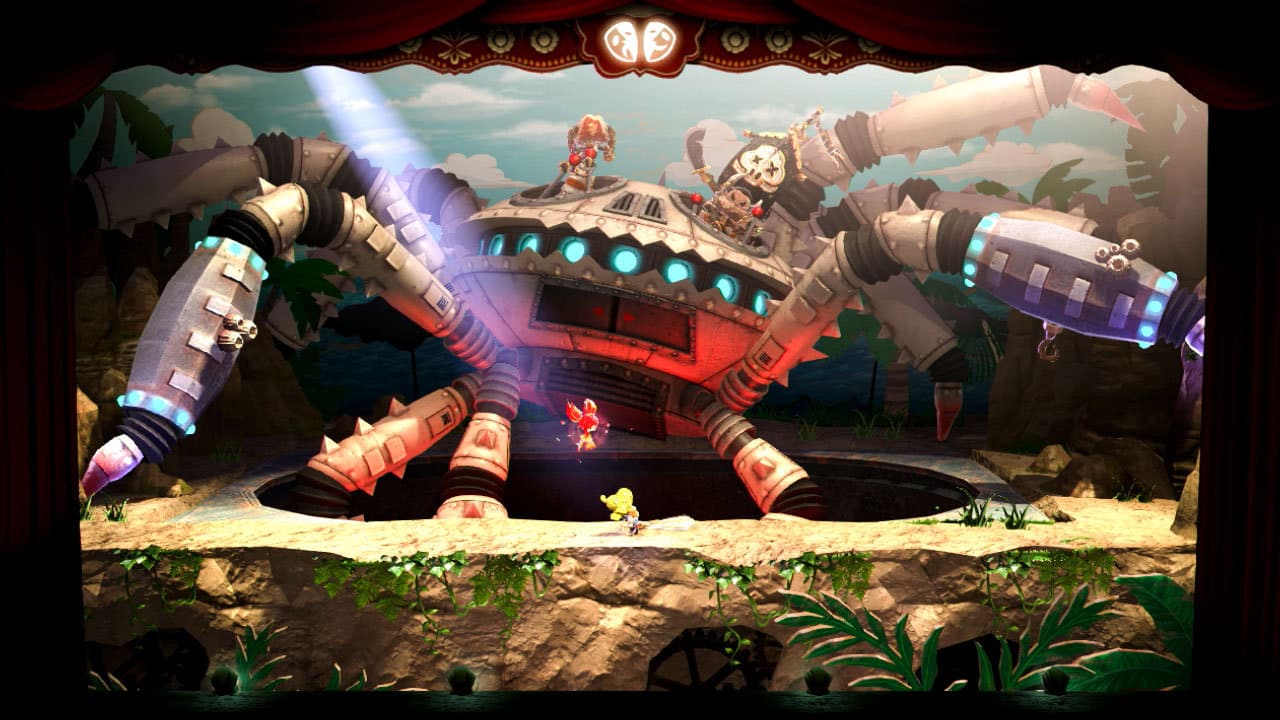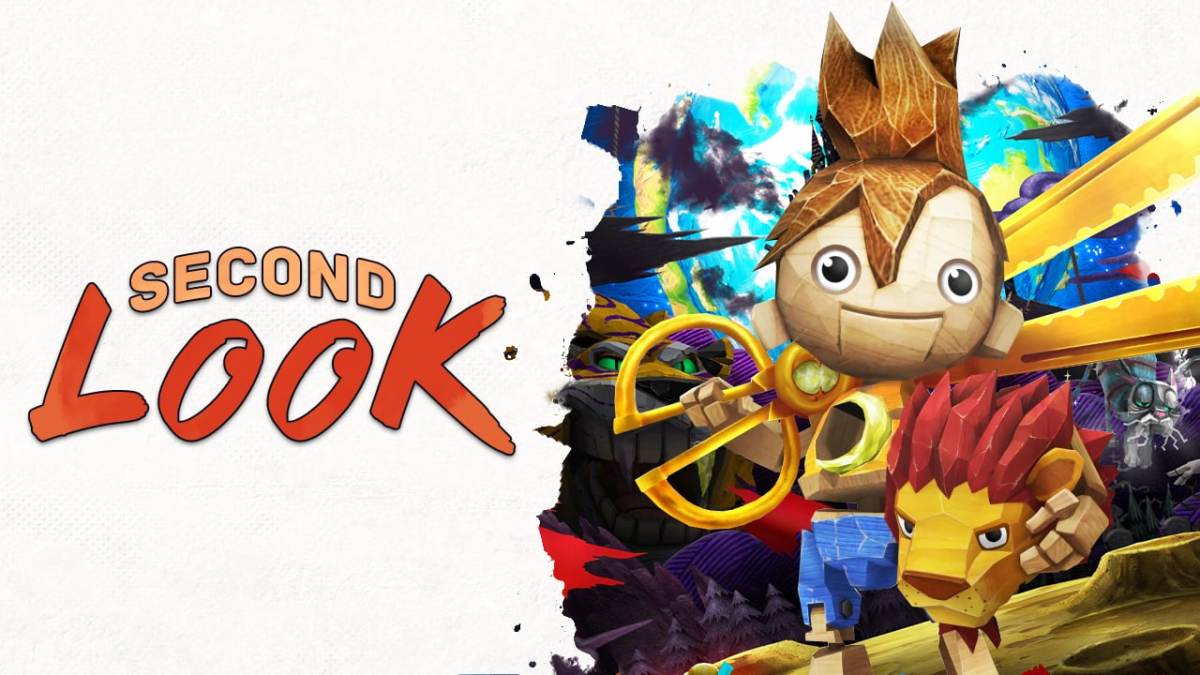I’m in a weird place with Sony. I’m kinda, sorta not hugely in love with its first-party output on PlayStation 4. There are some notable exclusives, but I feel its output this generation lacks the creative spark the company once had. Sony’s output wasn’t always a glut of third-person, over-the-shoulder action games. Instead, we got games like Puppeteer.
Odds are good you probably never knew Puppeteer existed. Unlike The Last of Us, this PlayStation 3 gem is not easily explained in a marketing blurb. SCE Japan Studio gave players the lead role in a live stage puppet performance, and no matter what madness occurs between the actors and their puppets — the show must go on! Strange as a pitch as it might be, it’s instantly a work of art in motion.
Puppeteer is technically a 2.5D platformer, but it also incorporates point-and-click adventuring, tearing through fabric for traversal, and item puzzles. Levels don’t justy scroll, but pop forward as you scale each stage. Every element is treated like it’s a physical object, be it young hero Kutaro, the colossal generals of the menacing Moon Bear chasing you, or one of countless background slapstick gags. Also, it’s a surrealist fantasy comedy in the vein of classic Japanese folklore with a twinge of Terry Prachett.
It’s a bit much, but the beautiful thing is… it all works. Puppeteer is the sort of wildly indulgent, over-the-top, dressed-to-the-nines exclusive that made PlayStation 3 so memorable. Whether cutting your way across playing cards or dueling a mad frog queen under the sea, everything comes together effortlessly. The menus are presented like pre-show title cards, with the narrator chiming in if you leave the game idle. Boss encounters are all based around practical effects, so you’ve got flying bannermen with gears beneath their armor you have to smash apart, as well as jam-spewing rats on jetpacks. With the game originally built with 3D TVs in mind, countless elements fly out at you organically, making an impact even as a 2D experience.
The central gimmick is that the hero Kutaro wields a magical pair of scissors, which are used in both combat and traversal. You’ll cut through the air across paper bats and leaves to ascend, then tear through evil bannermen and the game’s menagerie of delightfully absurd bosses. It’s hard to put into words how perfectly SCE Japan Studio makes the act of cutting through Puppeteer’s environments feel like a synesthetic treat. Jumping in other games feels impotent by comparison, and I could say the same for just about every other ability. Toss a bomb, and it pops into ruffled paper balls and a puff of smoke. Enemies from before you even get the shield block ability have satisfying interrupt animations in case you revisit past levels.
And you will indeed be revisiting past levels, because move over, Where’s Waldo — there are a maddening amount of secrets hidden in each stage. In addition to Kutaro, you’ll always have access to a companion who can interact with the background, often unlocking additional collectible gems accompanied with a snort-worthy gag or three. It’s impossible to catch everything in a single playthrough, making every run feel organic and personal. Plus, as you learn the levels, you’ll discover a secondary use for Puppeteer’s other brilliant mechanic — your life system.

Puppeteer innovatively makes its life system a core part of the world rather than some obligatory element. Sure, you’ll earn traditional lives by collecting a hundred gems, and they’re stored between levels so you’ve always got them at the ready. Yet you often won’t need them. No, Puppeteer is smarter than this and goes deeper.
Our hero Kutaro has his head stolen, his soul scooped up and taken to the Moon, where this all takes place. Obviously he can’t do much without a head while trying to earn his original one back, so he starts grabbing anything he can as a replacement. A crown. A family of frogs. A spider. A bonsai tree. A spiked mine. Really anything. And if they get lopped off? You can grab them!
Instead of losing them permanently, if you reach them in time, you can recover your head and keep going. You carry three heads at a time, each of them boasting a unique animation that can unlock bonus areas across every level. There are easily over 50 heads in total, with a written story behind them that you can look at during “intermission.”
I can’t overstate how brilliant this system is, as it inherently encourages players to experiment with every stage. Sometimes it’s actually worthwhile to lose your head for a moment to get around an otherwise deadly hazard. Even if you fail to catch your head in time, the game simply converts the lost head into gems for you to collect, letting you hedge your bets that you’ll get an extra life in case you lose all three of them. Just like with the scissors, I’ve never seen another game take an approach quite like this.
It also warrants saying that, for as over the top and silly as the story may be, Puppeteer’s narrative instantly charms you. Every member of the cast does their job perfectly, which is especially impressive since they sometimes have to intentionally go off-key. It feels like a small theater production that’s punching above its weight with this elaborate puppet show. The characters can break the fourth wall at any point, talking to the narrator and the crew behind the scenes as mishaps occur along your journey. The abundant genuinely human comedy sells it all in a way some of the most highly detailed, “gritty” stories in gaming could only dream of.
Finally, the game is a gorgeous delight, both in art direction and sound design. The foley work on this is some of the best I’ve ever heard. The frame rate is buttery smooth no matter what’s happening — even when multiple sections of a level are visibly loaded at once, ready to pop into view. Where many remember seventh-gen for being when games became obsessed with dull grays and browns, Puppeteer explodes with color at every turn. In every way you could want, Puppeteer is amazing.
Normally this is the part where I would lament that many folks never played it back when the PlayStation 3 was relevant — but it’s not actually landlocked to seventh-gen. Sure, it hasn’t received a remaster — which it should because it’s precisely the sort of game that would look all the more gorgeous on PlayStation 5 — but it is available on PS Now. So if you’ve got a stable internet connection and either a PlayStation 4 or a PC with a game controller, there has never been a better time to treat yourself to something so purely delightful as Puppeteer. I can only hope that the PlayStation 5, which is diversifying its breadth of titles, recaptures this creative energy.






Published: Sep 24, 2020 12:00 pm